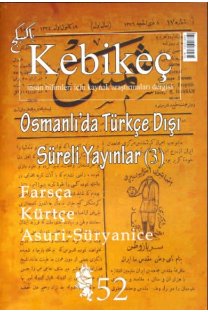İstanbul’da Yayınlanan Rumca Kadın Dergilerinde Eğitim Tartışmaları
Makale, Osmanlı İmparatorluğu’nda 19. Yüzyılda 1908’de Meşrutiyet’in ilanına kadar olan süreçte Ortodoks Rum cemaatinde kadın süreli yayıncılığı ile eğitim arasındaki ilişkileri irdelemektedir. Bu yayınlardaki kadın söyleminde kadınların eğitim hakkı dile getirilirken, süreç içinde kavramların nasıl biçimlendiği ve ileri sürülen savlarla kamu eğitimi ve kadın eğitimine felsefi yaklaşımlardan nasıl etkilendiği de gündeme gelmektedir. Çalışma İstanbul’da kadınlar tarafından yayınlanan ve bütün İmparatorluktaki kadınlara seslenen üç süreli yayın yani Kipseli (1845), Evridiki (1870-1873) ve Bosporis (1899-1906) üzerinde odaklanmaktadır. Eğitim tartışmalarında orta sınıf kadınların eğitimi konu edinilirken, kadınların genel eğitiminin de gündeme girdiği ve 1870’lere kadar oldukça radikal biçimde ele alındığı görülmektedir. Bu tarihten sonra ise tartışmalarda yalnızca elde edilen kazanımlar üstünden kadın eğitiminin niteliğinin yükseltilmesi ile sınırlı kalındığı saptanmaktadır.
The paper is concerned with the connection between women’s publishing culture and education within the Orthodox/Greek communities (Rum Millet) of the Ottoman Empire, during 19th century and until the 1908 Constitutional Reform. More specifically, the paper investigates how women’s discourses in periodicals negotiated women’s right to education, focusing on the changing content of ‘female popular education’ claimed. the argumentation and the philosophical traditions that underlie education and popular education claims are also presented. The study is based on three Greek women’s journals published in Istanbul, namely Kypseli (1845), Eurydice (1870-1873) and Bosporis (1899-1906) - the only ones edited by women and addressed exclusively or mostly to female readership within the entire Ottoman Empire during the period under study. The paper argues that although middle-class girls’ education was the apparent focus of the education-related debate in the journals, women’s popular education featured in the agenda, spotlighting the dominant education discourses as highly progressive -almost radical- for the era until the 1870s. From this point in time onwards, women’s discourses appeared to be limited to improving education quality, without venturing outside what had already been achieved.
- ISSN: 1300-2864
- Yayın Aralığı: Yılda 2 Sayı
- Başlangıç: 1995
- Yayıncı: Mehtap Yüksel
Sayıdaki Diğer Makaleler
“Ankara’da yalnız ve yalnız Süreyya var”
Türkçeyi geliştirme stratejisi olarak tercüme
Tanzimat Dönemi’nden Önce Osmanlı Hukuku’nda Evlilik Dışı İlişkilere Verilen Cezalar
İstanbul’da Yayınlanan Rumca Kadın Dergilerinde Eğitim Tartışmaları
Katerina DALAKOURA, Gülsün Aivali AKSOY
Bir Miladın Şahidi: Bosna-Hersek’te İsviçreli bir doktor Josef Koetschet (1830-1898)
“...Şu Tehlikeli Araç…” : Araba Sevdası’nda Dil Durumları
Basın ve iktidar ilişkileri: birinci Meclis’in Men-i Müskirat Kanunu üzerine tartışmalar
